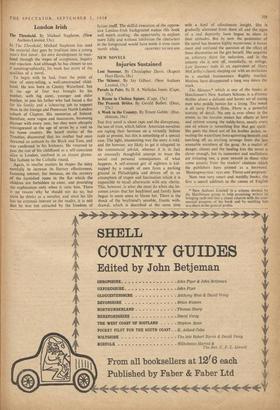London Irish
The Threshold. By Michael Stapleton. (New Authors Limited, 15s.) IN The Threshold, Michael Stapleton has used the material that goes by tradition into a young man's first novel : his own development to man- hood through the stages of acceptance, inquiry and rejection. And although he has chosen to use it autobiographically, his book has many of the qualities of a novel.
To begin with he had, from the point of view of story-telling, a well-constructed child- hood. He was born in County Waterford, but at the age of four was brought by his mother, with big sister, younger and elder brother, to join his father who had found a flat for his family and a labouring job to support them in the foreign and Protestant North London suburb of Clanton. His memories of Ireland, therefore, were vague and inaccurate, becoming dimmer with every year, but they were abruptly reinvigorated at the age of seven by a visit to his home country. He heard stories of the Troubles, discovered that his mother had once thwarted an ambush by the Black and Tans, and was confirmed in his Irishness. He returned to Pass the rest of his childhood as a self-conscious alien in London, confined in an almost ghetto- like fashion to the Catholic round.
Again, in smaller matters he shapes the story carefully to increase its literary effectiveness, fastening interest, for instance, on the mystery of the furnished room in the flat which the children are forbidden to enter, and providing the explanation only when it suits him. There is no reason why he should not do so; but since he thinks as a novelist, and since his life has no extrinsic interest to the reader, it is odd that he was not attracted by the freedom of
fiction itself. The skilful evocation of the oppres- sive London-Irish background makes this book well worth reading: the opportunity to explore more fully and without inhibition the characters in the foreground would have made it even more


































 Previous page
Previous page